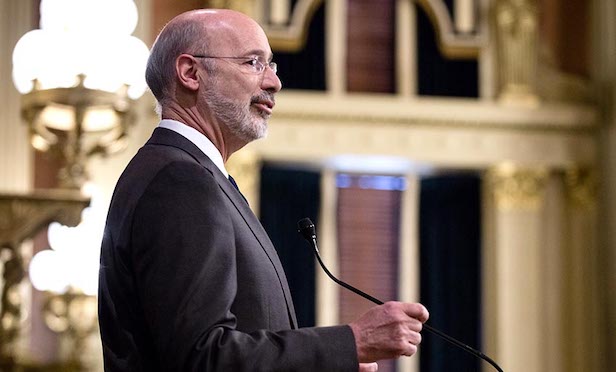 Pennsylvania Gov. Tom Wolf delivered his 2020 budget address to a joint session of the general assembly in Harrisburg on Tuesday.
Pennsylvania Gov. Tom Wolf delivered his 2020 budget address to a joint session of the general assembly in Harrisburg on Tuesday.
HARRISBURG, PA—Gov. Tom Wolf, in an address before a joint session of the general assembly here on Tuesday, urged lawmakers to support his ambitious agenda that includes significant funding to remediate environmental issues at schools and aging infrastructure, as well as provide additional funding for economic development programs.
"This year, I believe we have an opportunity to make enormous progress towards delivering on William Penn's vision for what Pennsylvania could be," said Gov. Wolf. "After five years of tough decisions and necessary investments, we have guided our commonwealth out of crisis and put Pennsylvania back on a path to prosperity. But we have a long way to travel."
Governor Wolf's budget includes plans to make more than $1 billion available to combat lead, asbestos, and other contaminants. The governor is also continuing to pursue $4.5 billion in funding through his Restore Pennsylvania plan, which will be used to upgrade and make repairs to Pennsylvania's aging infrastructure.
Among the governor's business-related proposals outlined in the budget address included:
• Proposing an increase in the minimum wage to $12-per-hour on July 1, 2020, with annual increases to $15-per-hour by July 1, 2026.
• A new $12-million grant program that will allow the commonwealth to fund projects tailored to addressing issues that have been identified as obstacles to employment—transportation, child care, re-entry, licensure and training.
• Requests a $2-million increase in funding to the Workforce and Economic Development Network of Pennsylvania, which assists companies with providing incumbent employees with training, encouraging them to build their workforce.
• The budget makes $12.35 million in targeted investments, distributed through key partners, which the governor states will serve as a catalyst to create an ecosystem for innovation to thrive.
• The governor is calling for corporate tax reform through closing the Delaware Loophole and a decrease of the corporate net income tax to 5.99% by 2025.
The governor's commitment to fund school and infrastructure repairs drew praise from Philadelphia city officials, including Mayor Jim Kenney, City Council President Darrell L. Clarke, School District of Philadelphia Superintendent Dr. William Hite, and Daniel J. Hilferty, chair of the Chamber of Commerce for Greater Philadelphia and CEO of Independence Health Group.
"We commend the governor's effort to focus on the state's aging school buildings as the investment can no longer wait. On behalf of our school children and teachers, we appreciate the governor's leadership on this issue and the urgent need for additional state support," said Mayor Kenney.
School districts across the Commonwealth have school buildings requiring billions of dollars in renovations, remediation, and repairs. In Philadelphia alone, the School District has $4.5 billion in deferred maintenance and $3 billion in future capital needs.
"We're glad to hear the governor's proposal to invest $1.1 billion to reduce risks to Pennsylvanians from lead and asbestos in our schools, childcare centers, homes and other public buildings," said Philadelphia Council President Clarke. "These investments are absolutely necessary—especially in our public schools. We welcome them."
© Touchpoint Markets, All Rights Reserved. Request academic re-use from www.copyright.com. All other uses, submit a request to [email protected]. For more inforrmation visit Asset & Logo Licensing.







